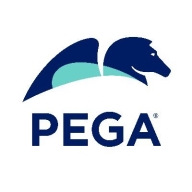

Pega Platform and IBM Case Foundation compete in the digital transformation and document management sectors. Pega seems to have the upper hand due to its integrated solution and flexibility, though it faces some stability challenges. IBM provides robust document management but lacks workflow flexibility.
Features: Pega Platform offers a no-code architecture, AI, decision-making, and robotic process automation, making it suitable for industries like banking, insurance, and government. Its comprehensive case management and rapid prototyping are notable. IBM Case Foundation is recognized for its document management stability and robustness, with a focus on traditional architectures non-ideal for modern workflows.
Room for Improvement: Pega needs to enhance its interface flexibility, improve AI and cloud capabilities, and simplify upgrades and training resources. IBM Case Foundation's outdated workflow engine requires upgrading, while the user experience and integration, particularly with multi-language support, need improvements.
Ease of Deployment and Customer Service: Pega offers multi-cloud deployment, including public, private, and hybrid options, providing greater flexibility than IBM's on-premises deployment. Pega's customer service varies, with some users seeking improvements, while IBM's complex setup and customer service hinder quick deployment and support.
Pricing and ROI: Pega Platform has a higher price point driven by licensing and premium features but provides substantial ROI through process efficiencies. IBM Case Foundation, while priced mid-range with options through IBM Cloud Pak, is viewed as costly relative to value, impacting its ROI perception.
| Product | Market Share (%) |
|---|---|
| Pega Platform | 5.2% |
| IBM Case Foundation | 0.5% |
| Other | 94.3% |


| Company Size | Count |
|---|---|
| Small Business | 5 |
| Midsize Enterprise | 5 |
| Large Enterprise | 6 |
| Company Size | Count |
|---|---|
| Small Business | 9 |
| Midsize Enterprise | 15 |
| Large Enterprise | 68 |
Pega Platform provides flexible business process management with a focus on rapid application development and automation through a low-code approach, enhancing efficiency across sectors.
Pega Platform is renowned for its ability to streamline operations with robust automation features, including robotic process automation and decision-making capabilities. Its intuitive interface and workflow management contribute to a reputation for enhancing business processes. Although users face challenges with integration limitations and high licensing costs, they benefit from rapid deployment and efficient process adaptations. The unified architecture reduces complexity, while case management and integration services support digital transformations in sectors such as banking, insurance, and healthcare.
What are the key features of Pega Platform?In industries like insurance, banking, healthcare, and government, Pega Platform is implemented to automate diverse workflows, supporting initiatives from claims processing to customer onboarding. Enterprises use Pega for case management and digital transformations, valuing its out-of-the-box integrations and real-time reporting capabilities to boost operational automation and enhance customer experiences.
We monitor all Business Process Management (BPM) reviews to prevent fraudulent reviews and keep review quality high. We do not post reviews by company employees or direct competitors. We validate each review for authenticity via cross-reference with LinkedIn, and personal follow-up with the reviewer when necessary.